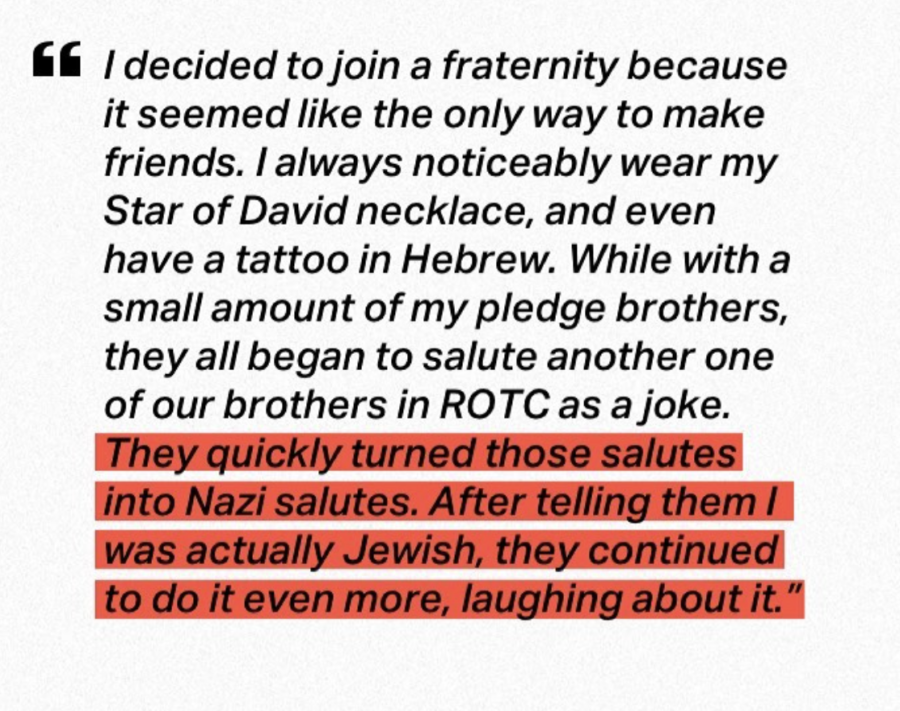Alleged anti-Semitic incident in fraternity prompts university, council response
April 7, 2021
Editor’s note: The Kernel follows the Associated Press’s spelling of “anti-Semitism” in regards to hostility and prejudices against Jewish people. However, the spelling “antisemitism” is also used and may be preferred on some occasions. The Kernel will abide by the AP.
An anonymous report of anti-Semitic behavior in a University of Kentucky fraternity has prompted a referral to the Office of Student Conduct and a statement from Interfraternity Council, the ruling body of 19 of UK’s Greek fraternities.
The anonymous report was originally posted by an Instagram account @jewishoncampus, which shares testimony from students at colleges across the U.S. about anti-Semitic treatment.
The post attributed to UK’s campus alleges that members of an unnamed fraternity greeted one of their pledge brothers with Nazi salutes on multiple occasions.
“After telling them I was actually Jewish, they continued to do it even more, laughing about it,” the testimony says.
The anonymous student said they “always noticeably wear” a Star of David necklace and have a tattoo in Hebrew, and that they originally joined the fraternity as a way to make friends.
Sources declined to name the fraternity in order to protect the anonymous individual.
Kentucky Hillel, an organization for Jewish students, will submit a letter of concern to the university as a formal beginning to the conduct process, according to Hillel president Melanie Gelernter.
Gelernter spoke to the anonymous student, who told her he did not have malice against the fraternity and that the situation was handled by fraternal leadership at the time.
“I don’t know really what conversations he had with his fraternity leadership at the time, but he did say it wasn’t the fraternity that has these anti-Semitic tendencies, it was just a group of anti-Semitic individuals who happen to be members of that fraternity,” Gelernter, a UK senior, said.
Gelernter first saw the post when a Hillel member shared it in their group chat, and found the salutes “abhorrent.” Though she was caught off guard by the incident, she was not necessarily surprised.
“It was almost a feeling of ‘well, like’ – it almost feels inevitable,” Gelernter. “I don’t like that word because it means that there’s not much change that can be made from it, but at the same time [anti-Semitism] feels almost expected.”
As a previous chair of diversity and inclusion for Greek life, Gelernter thought UK’s Greek organizations were more educated and tolerant than this.
“Anti-Semitism isn’t necessarily prevalent,” in Greek life at UK, Gelernter said. “But at the same time it’s very normalized, and it can be very sort of covert and not very identifiable all the time.”
@jewishoncampus posted the anonymous testimony on April 1. Six days later, Kentucky IFC shared a statement regarding the incident on their Instagram page.
“We are absolutely disgusted and upset by the behavior of those members,” the statement from IFC’s Diversity and Inclusion chair, Brandon Brown, said.
The on campus Jewish community is disappointed in the responses, according to Gelernter.
“The feeling that Jewish students are having from [Fraternity and Sorority Life] communication and from the IFC statement is that it’s not enough,” Gelernter said. “It seemed very generic and vague and non-descriptive of the situation, which if we’re going to call out anti-Semitism, we have to be very concrete and direct about it because it is so normalized and so often hard to pinpoint, although this one feels pretty easy to pinpoint.”
UK spokesperson Jay Blanton confirmed that the incident has been reported to the university’s Office of Student Conduct.
“We take this issue very seriously,” Blanton said.
Gelernter said the response from Fraternity and Sorority Life, the office that oversees Greek organizations, has been slow-moving.
“Basically it’s sort of come down to, they need the student to submit an incident bias report, and they are requesting that Hillel send them a letter or statement of concern in order for them to really proceed,” Gelernter said. The lack of response from FSL is the biggest issue, she said.
Jewish students are especially concerned because a Jewish fraternity, Zeta Beta Tau, is supposed to launch a chapter on UK’s campus next school year.
“It’s just a little bit scary to think about,” Gelernter said. “If there are anti-Semitic incidents in Greek life and they’re potentially not being handled maybe the way they should be this year, what’s going to happen next year when there’s even more of a spotlight on Jewish Greek students?”
IFC members were instructed not to respond to media inquiries on “literally anything,” according to a message from a university employee obtained by the Kernel.
The message said the employee does not want “anyone to twist your words” or for fraternities to get in trouble with their national headquarters.
Instead, they were instructed to route media through UK public relations. The Kernel had requested a comment from IFC’s president and received no response.
For Gelernter, the lack of action from Greek life is personal because it hits the intersection of her Jewish and sorority communities.
“I gave it a lot of my time and energy towards diversity and inclusion efforts in Greek life, so it just really stinks that they aren’t taking this as seriously as Jewish students would hope and would like,” Geler
nter said. However, she has faith that the FSL staff will be diligent in pursuing the student conduct process.
She reached out to administrators she worked with while D&I chair of UK Panhellenic to express her concerns. Matters referred to the Office of Student Conduct undergo an investigation and informal conduct hearing before probation or other steps are taken.
Gelernter said she isn’t sure what the repercussions should be but hopes that the students who used the Nazi salute are identified and removed from the fraternity. However, she said the Jewish community would rather have education offered instead of punishment.
“Making sure students who might not understand our identity or background or ethnicity just can gain a deeper understanding so that they don’t feel like things like that are funny,” Gelernter said.
Anti-Semitic incidents are not new on UK’s campus. The Jewish Student Center’s sign has been vandalized four times in the last five years, including in November of 2020.
A member of the Chabad of the Bluegrass, the organization that runs the JSC, was injured during a Menorah ceremony in December when an unknown driver “grabbed the Chabad member and forcibly dragged them down the street as the vehicle accelerated,” according to a previous Kernel article.
The Chabad member suffered extensive injuries after the unknown assailant ran over his leg, but none were life-threatening. Lexington police said the incident was not a hate crime, but appeared to have escalated from road rage.
Flyers with anti-Semitic messages were distributed in Lexington in August of 2020, then again in November and December.
“I do definitely have a concern, a big concern, with the increase of anti-Semitism as more Jewish students are spotlighted through fraternity recruitment,” Gelernter said.
She said that she has seen anti-Semitic attacks increase in recent years, but not to the point where she hides her Jewish identity on campus.
“The action itself is obviously problematic,” Gelernter said of the Nazi salutes in this particular incident. “But I will say Jews are first sort of almost preconditioned, you know, things like that really really stink and they hit us exactly where it hurts and it really gets to us.”




























































































































































